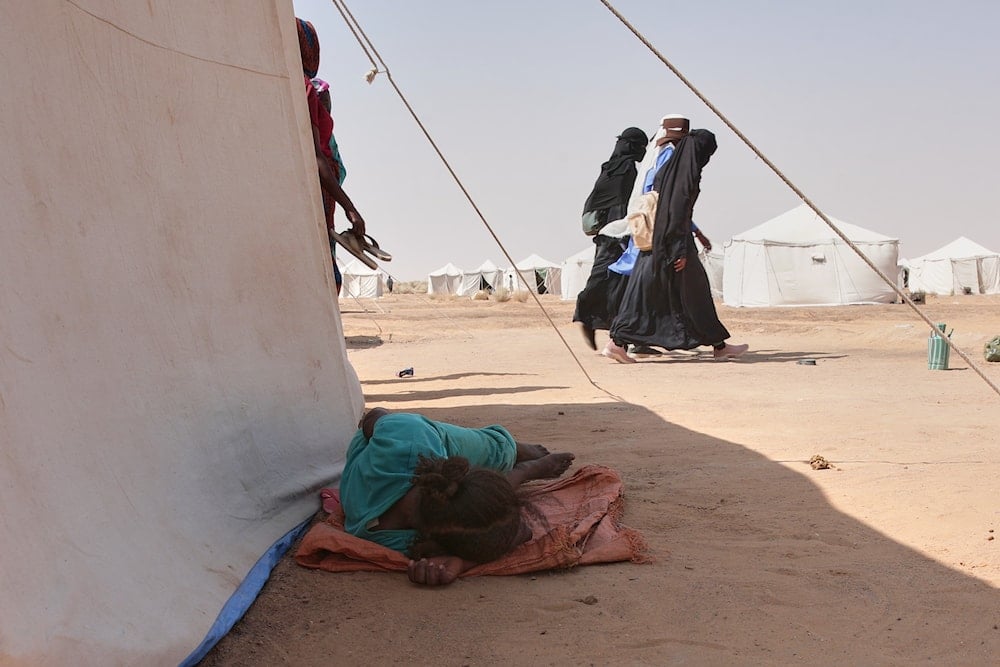UN unanimously approves Sudan fact-finding mission to probe RSF crimes
The UN Human Rights Council addresses mass atrocities in El Fasher, with a proposed fact-finding mission to investigate RSF crimes and regional destabilization.
-

People displaced from North Darfur's capital, El Fasher, and other conflict-affected areas settle in the newly established El-Afadh camp in Al Dabbah, in Sudan's Northern State, Sudan, Thursday, Nov. 13, 2025 (AP)
The UN Human Rights Council has adopted by consensus a resolution for an independent UN fact-finding mission to investigate mass atrocities in El Fasher, Sudan, as the Darfur city fell to the paramilitary Rapid Support Forces.
Following a special UNHRC session, the approved fact-finding mission would not only investigate the reported atrocities but also seek to identify the perpetrators of the violations allegedly committed by the Rapid Support Forces and their allies in El Fasher.
"There has been too much pretence and performance, and too little action. It must stand up against these atrocities – a display of naked cruelty used to subjugate and control an entire population," UN High Commissioner for Human Rights Volker Turk said in an opening address to the delegates.
Turk's call for action against individuals and companies "fuelling and profiting" from the war in Sudan was coupled with a stark warning regarding the surging violence in the central Sudanese region of Kordofan, a crisis characterized by bombardments, blockades, and people being forced from their homes.
The draft text strongly condemned the reported ethnically motivated killings, as well as the use of rape as a weapon of war by the RSF and their allied forces in El Fasher.
Rape, killing, torture: An outline of the RSF
A member of the UN's Independent International Fact-Finding Mission for Sudan, Mona Rishmawi, described examples of rape, killing, and torture and emphasized the requirement for a comprehensive investigation to establish the full picture.
Rishmawi said that RSF forces had "turned El-Fasher University into a killing ground" for thousands of sheltering civilians and that witnesses had also recounted seeing bodies piling in the streets, as well as trenches dug in and around the city.
The proposed resolution stops short of mandating an investigation into the role of external actors who may be supporting the RSF, a point which the ambassador to the permanent mission of Sudan in Geneva criticized by saying that his country faced an "existential war" following the international community's failure to act.
"We were warning all over the UN... calling for pressure on the rebel militia and the country that is sponsoring it with military equipment - I mean the UAE," Hassan Hamid Hassan said.
UAE vehemently denies connection to RSF
The UAE ambassador to the UN in Geneva, Jamal Al Musharakh, on Thursday categorically rejected claims that it provides support in any form to either of the warring parties, despite accusations from Sudan's army that it supplies the RSF with weapons, a claim which UN experts and US lawmakers have found credible.
The United Kingdom, the European Union, Norway, and Ghana expressed support for the resolution by strongly condemning the violence in Sudan and warning that it could threaten regional stability.
The resolution also contains a call for both the RSF and the Sudanese Armed Forces to allow life-saving aid to reach the many people who may still be trapped inside the famine-struck city.
50 thousand El-Fasher refugees arrive in Al-Dabba
On Friday, a relief commission said that approximately 57,000 displaced people have arrived in the city of Al-Dabba in the Northern State of Sudan from the Darfur and Kordofan regions due to attacks by the Rapid Support Forces (RSF).
Kawthar Jaafar, the Humanitarian Aid Commissioner appointed by the Sudanese government in Al-Dabba, reported that the displaced people endured harsh conditions during their journey as they fled from what she described as "the brutality and violations of the rebel militias."
She explained that among the displaced are people suffering from wounds and fractures, in addition to children suffering from malnutrition. She added that, out of the total number, 50,000 displaced people arrived from the city of El Fasher, with 32,000 of them reaching Al-Dabba after the city fell to the Rapid Support Forces.
RSF massacres in El Fasher after 2-year siege
In April 2023, the conflict between the Rapid Support Forces (RSF) and the Sudanese Armed Forces (SAF) intensified around El Fasher. The siege escalated as the RSF launched repeated assaults and artillery strikes, trapping civilians in the crossfire and cutting off essential services. The city, a key stronghold in North Darfur, quickly became a focal point of the war.
By mid to late 2025, El Fasher faced a worsening humanitarian catastrophe. Aid convoys were unable to enter, water and food supplies dwindled, and thousands of residents were displaced. On October 16, 2025, heavy RSF attacks on civilian areas and displacement camps were reported, leaving dozens dead and further straining the city’s already overwhelmed health infrastructure.
On October 26, 2025, the RSF seized full control of El Fasher after the SAF’s 6th Infantry Division withdrew to avoid further devastation, ending an 18-month-long siege. In the days that followed, reports emerged of mass killings, including executions and atrocities targeting non-Arab communities. Estimates indicated that at least 1,500 people were killed in the immediate aftermath.
Since the RSF’s capture of El Fasher on October 26, 2025, eyewitnesses and humanitarian monitors report horrific atrocities.
Survivors described how RSF fighters executed wounded patients inside El Fasher Teaching Hospital, which had already been severely damaged by shelling.
Entire neighborhoods such as al-Kabri and al-Zuhur were emptied as RSF forces carried out door-to-door raids, killing men and abducting women. Mass graves were discovered on the outskirts of the city, and trenches were reportedly dug in preparation for large-scale burials.
In one documented instance, RSF combatants allegedly turned El Fasher University into a detention and torture site for displaced civilians who had sought shelter there.

 6 Min Read
6 Min Read










